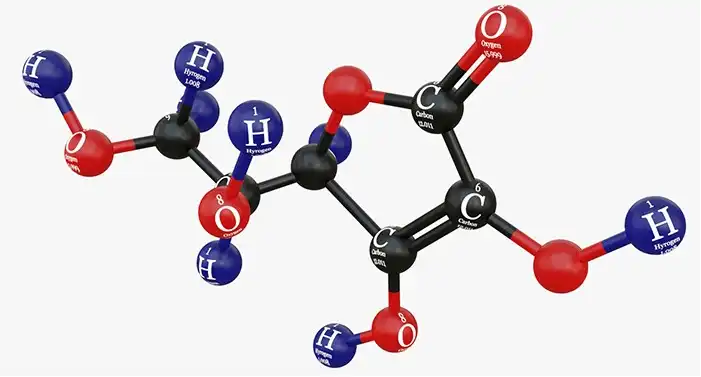What is ascorbic acid powder used for?
Is ascorbic acid the same as vitamin C?
Ascorbic acid powder, commonly known as vitamin C powder. It is a water-soluble vitamin that is naturally present in various fruits and vegetables, and its chemical structure is composed of ascorbic acid.
Ascorbic acid is the chemical name for vitamin C. Ascorbic acid is the pure form and the most common synthetic form of vitamin C. It is the biologically active component responsible for the various functions and benefits associated with vitamin C.
When we consume foods or supplements containing vitamin C, it is converted to ascorbic acid in our bodies. Ascorbic acid serves as an essential nutrient and antioxidant, playing important roles in collagen synthesis, immune function, iron absorption, and protection against oxidative stress.
It's worth noting that there are other forms of vitamin C, such as sodium ascorbate, calcium ascorbate, or ascorbyl palmitate, which are commonly used in supplements or fortified foods.
In summary, while "ascorbic acid" refers to the pure compound, "vitamin C" is the commonly used term for ascorbic acid as a nutrient and dietary supplement.
What is the chemistry of ascorbic acid?
It belongs to the family of compounds known as monosaccharides, specifically the enediol structure.The enediol structure of ascorbic acid allows it to act as both an antioxidant and a reducing agent.
The structure of ascorbic acid consists of a six-carbon sugar molecule called D-glucose, with an additional lactone ring formed by the carbon atoms at positions 1 and 6. The lactone ring gives ascorbic acid its unique chemical properties.
It is highly soluble in water due to its hydrophilic nature, allowing it to dissolve easily and be readily absorbed by the body.
One of the notable properties of ascorbic acid is its ability to donate electrons to unstable free radicals, neutralizing their harmful effects and preventing oxidative damage. This antioxidant property makes it important in various biological processes, including collagen synthesis, iron absorption, and immune function support.
Under certain conditions, such as exposure to heat, light, or alkaline pH, it can undergo oxidation and lose its effectiveness. This is why vitamin C supplements are often formulated with stabilizers to prevent degradation.
Overall, the chemistry of ascorbic acid is critical to its role as an essential nutrient and antioxidant molecule in the human body. Its unique structure and chemical properties contribute to its various functions and biological effects.

What does bulk ascorbic acid powder do to skin?
★Antioxidant
Oxidation refers to the damage of free radicals to cells, which is manifested in the skin as uneven skin tone, color spots, dry lines and so on. Whether oral or topical, vitamin C can fight the damage caused by free radicals. Especially for external use, it can significantly improve skin conditions caused by oxidation. For example: inhibit the formation of melanin, fade color spots, improves uneven skin tone.
After vitamin C is absorbed by the skin, it can also play a role in the dermis of the skin to resist UV damage and avoid blackening the skin. So the effect is better when used before UV rays damage the skin.
Ascorbic acid does not act independently of other cells as an antioxidant.
Importantly, it is also able to reduce photooxidized alpha-tocopherols, thereby regenerating vitamin E, which contributes to antioxidant storage in the skin.Thus, not only does it work by scavenging reactive oxygen species itself, but it also enhances the antioxidant activity of alpha-tocopherol to prevent free radical damage. In fact, topical ascorbic acid and alpha-tocopherol significantly increased photoprotection against UV-induced erythema and reduced the number of sun-damaged cells compared to antioxidants alone.
★Anti-saccharification
This is a new concept, skin glycation, which means that too much sugar can damage the collagen in the skin. In other words, sugar accelerates skin aging. Vitamin C can promote collagen synthesis and delay aging.
Some papers have shown that daily topical use of 5% ascorbate can increase the mRNA levels of type I collagen and type III collagen, and also increase the mRNA levels of carboxyprocollagen, amino-procollagen proteinase and lysine oxidase.
Vitamin C can promote metabolism, improve the skin's immunity, enhance the skin's barrier function, prevent and improve sensitive skin.

However, it should be noted that the PH value of high concentration of vitamin C is low, the lower the PH value, the stronger the acid, the more irritating to the skin, and the more unfriendly to sensitive skin, so when using, start from a low concentration and gradually increase the concentration.
The function of ascorbic acid in food industry
It is a commonly used antioxidant in food and is widely used as a food additive, such as using the reducibility of ascorbic acid as an amendment in bread to reduce o-quinone compounds, thereby effectively inhibiting enzymatic Browning.
And because ascorbic acid has strong antioxidant activity, it is often used to protect folic acid and other substances that are easily oxidized.
The function of ascorbic acid(ASA) in plants
AsA, as a high-abundance small molecule antioxidant, exists in plant cells in large quantities and plays an important role in the growth and development of plants and the formation of fruit quality.The main sources of AsA for humans are fruits and vegetables, and the AsA content of different plants varies greatly.
Anti-oxidation, photoprotection or as a cofactor of some reductase and improve stress resistance. Recent studies have found that AsA also has many other important biological functions in plants, such as affecting carbon and nitrogen metabolism, clearing active oxygen species, affecting fruit quality, seed germination and storage, and participating in the expression regulation of related genes in the process of hormone synthesis and signal transduction.
Is it safe?
It is generally considered safe for most people when consumed in appropriate amounts through food sources.
The recommended dietary allowance of vitamin C for adults is typically ranges from 75mg to 120mg per day. It is usually easily obtained through a balanced diet that includes fruits and vegetables rich in vitamin C.
In normal doses, ascorbic acid is well tolerated and rarely causes adverse effects. However, extremely high doses of vitamin C, particularly through supplementation, may lead to gastrointestinal symptoms such as diarrhea, nausea, and abdominal cramps.
The best bulk ascorbic acid powder supplier
Please email us at angel@angelbiology.com ,we are of service at any time!
Reference:
[1].Betty V. Topically Applied Vitamin C Enhances the mRNA Level of Collagens I and III, Their Processing Enzymes and Tissue Inhibitor of Matrix Metalloproteinase 1 in the Human Dermis. THE JOURNAL OF INVESTIGATIVE DERMATOLOGY. 2001.
[2].TIAGO L. When is an antioxidant not an antioxidant? A review of novel actions and reactions of vitamin C. Free Radical Research. 2005.
8. Viktor A. Redox Interactions of Vitamin C and Iron: Inhibition of the Pro-Oxidant Activity by Deferiprone. Int. J. Mol. Sci. 2020.


